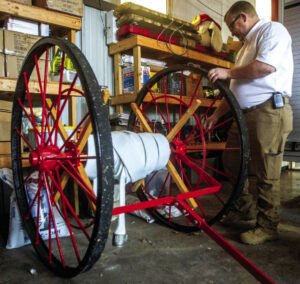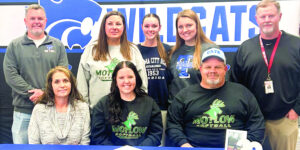Pond owners offered guidance on healthy waters
FRANKLIN COUNTY — When the summer heat settles over north Alabama, many pond owners face the same frustrating problems: Weeds taking over the water, fish turning up dead or fish that never seem to grow.
That’s where the Alabama Cooperative Extension System can step in.
“The two biggest calls I’ve had this summer are, ‘Help, the weeds are out of control,’ and ‘Help, my fish are dying,’” said Talon Crowell, Aquatic Resources Extension agent.
It is a role that puts him in direct contact with landowners facing challenges both big and small.
“What I try to do is help people understand what’s going on and what they can do about it.”
Crowell is based in DeKalb County but covers northAlabama–including Franklin County. Extension services are offered through Auburn University and Alabama A&M University.
Agents are taxpayer funded, meaning there is no fee for residents to call and ask for help.
“We don’t work for people, we work alongside them,” Crowell explained. “I can give recommendations, but at the end of the day it’s their decision how they want to manage their ponds.”
That approach often comes into play when people contact him about ponds that have been in their families for years. Many of the ponds he visits are inherited. Families pass land down through generations, and the ponds sometimes go untouched for years.
“A lot of people inherit a pond from their grandparents or parents, and nothing’s been done to it in a long time,” Crowell said.
By that point, Crowell said problems can feel overwhelming.
“I try to help them sort out what’s happening and figure out a plan to bring it back.”
Crowell said the problems he sees most often involve vegetation and oxygen levels. Weeds are best handled early in the spring before they spread.
“Once they cover a pond, it’s a lot harder to control,” he said, noting there are different approaches for working to remedy such problems.
“They usually don’t know what the troublesome plant is, and they’ll send me photos to identify, and then I’ll help them with either a biological control, such as adding a certain plant to help with weed management, or with a herbicide to spray as a chemical control,” Crowell said.
He said he tries to avoid solutions that involve putting chemicals in the pond.
“You don’t want to just go spraying chemicals if you don’t have to, but some of the issues are so bad that it’s the only way to get control again.”
When it comes to fish kills, he said the culprit is usually low dissolved oxygen. That can happen when storms mix the layers of a pond, spreading low-oxygen bottom water throughout.
It can also happen when an algal bloom suddenly dies off after several cloudy days, depleting oxygen as it decays.
In addition to those issues, Crowell said many questions focus on how to stock a pond properly.
He said Auburn research dating back to the 1960s shows the best balance is 500 bluegill and 50 bass per acre. Channel catfish are a common species added to private ponds.
This combination helps create a predator-prey balance that keeps fish populations healthy.
Crappie, on the other hand, are not recommended for small ponds.
“They really need 15 acres or more to do well,” he said. “If someone really wants crappie, there are hybrids, but most of the time bass and bluegill are the way to go.”
He also reminds landowners that catchand- release is not always best. If some fish are never taken out, ponds can become overcrowded, and fish stay stunted. Removing some fish gives the remaining ones room to grow.
While much of his work deals with recreation ponds, Crowell also fields questions about raising fish commercially. He said opportunities exist in Alabama but come with steep hurdles.
“There’s always a chance for diversification, but it’s not easy,” he said. “The equipment and land alone put you deep in the hole before you even buy fish.”
Crowell said aquaculture is hard to get into because there’s so much competition.
Alabama is well known for catfish farming, especially in the west, and there are shrimp farms operating in places such as Cullman.
Interest in other species sometimes comes up as well. Auburn also works with tilapia, though those are difficult to grow outdoors in Alabama because they die off in cold weather.
“Tilapia do well in the summer, but you’d really need an indoor setup to raise them efficiently here,” Crowell explained.
Whether it’s aquaculture or pond management, Crowell said the starting point is the same: Ask for help. For Franklin County residents, the best first step is simply calling their Extension office.
“The number one resource is Extension agents like me,” Crowell said. “People can tell me their goals, and I can help them manage their ponds based on what they want.”
He also sees himself as a connector. “I don’t have experience building ponds, but I know who does,” he said. “Sometimes my job is pointing people to the right resources or the right person who can help.”
The Extension website, aces.edu, offers publications and guides on fisheries topics.
Crowell hopes to begin hosting workshops by spring, possibly with both in-person and online options so residents can join from anywhere. Covering 19 counties means he cannot be everywhere at once, so he is considering a rotation system, offering sessions in different counties every other year.
Most of his work is with adults, but he occasionally visits ag classes when invited. Youth programming is primarily offered through 4-H.
He also pointed to Alabama Water Watch, a program where volunteers monitor streams and rivers in their communities. The effort gives citizens a chance to collect data and be more involved in local water quality.
All of it, he said, comes back to the same mission: Providing accessible support for residents.
Extension help is accessible to anyone.
“Our services are free to the public,” Crowell said. “People don’t have to pay a fee for me to come out or answer their questions.”
Workshops may charge a small registration fee to cover food or materials, but otherwise, the support is available at no cost.
His goal is to make sure pond owners and residents know they have support close at hand.
“I don’t want to just be the pond guy,” he said. “I want to be able to help people with any of their aquatic needs and point them to the right resources.”
For information, Crowell can be reached by email at tkc0008@auburn. edu or by phone at 334752-1500.







